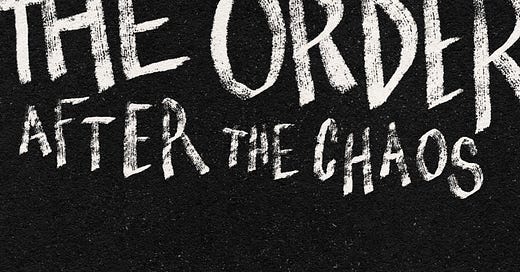The phenomenon of ‘resolutions’ is a fascinating and pervasive part of modern life. Most commonly in January, we engage in a practice of resolving to be different in ways we have deemed to be better. January is the month with the highest churn rate of employees, the lowest alcohol sales, and the month with the highest number of gym memberships. In the global north, January is closely aligned with Christmas and New Years–it is the order after the chaos, the refinement after the frivolity, the time, in deepest darkest winter, to rebirth yourself.
Art created by Egon
Studies show that we are most likely to stick with new habits if we begin them at the start of distinct ‘chunks’ of time: the beginning of a school year, the day after your birthday, January first. To me, this suggests an innate longing we have to create artificial before and afters of self. Marooned in the present–having only ever known the present–we long for a drastic future (now become present) to be as life-altering as we imagined it would be.
It was never about simply leaving the job, or giving up alcohol, or joining the gym: it was that life was supposed to feel different once we were different. The great disappointment (and potential liberation, as Oliver Burkeman in his wonderful latest book Four Thousand Weeks explores) is that no matter how much we change, we are always more or less ourselves, and the present is always characterized by some underlying flavor of angst, disappointment, or boredom, while our future self is ever-retreating, placid, luminous, and perfectly freed from our current condition. In other words: we can only experience what we would like to feel like imaginatively, when we superimpose it onto a future state. As soon as we get there–well, as the maxim goes, “wherever you go, there you are.”
At this point, it might be helpful to turn to the etymology of the word ‘resolution.’ Ask someone today what their definition of the word is, and they are likely to say something like “the decision to do or be something.” In fact, if you google it, you’ll get “a firm decision to do or not to do something,” and then “the quality of being determined or resolute.” It is a hard word that implies drawing boundaries.
But the etymology of resolution is almost the exact opposite. Resolution comes from the Latin resolvere, which means “to loosen,” the past participle of which formed the noun resolutionem, meaning “the process of reducing things into simpler forms.” How are these two concepts tied together, and what light can they shed on our current relationship to resolutions?
Art by Egon
My best guess is that we can’t see parts clearly or delineated from the whole without first breaking them into distinct parts, and we can’t do that unless we ‘loosen’ the whole. Only by loosening do the separate components become evident: loosen the nut with a wrench and the multiple components of the gear fall away from each other. Loosen a strict regime and certain habits or hobbies continue, while others fall away. In a classic example, loosen your grip on the illusion of control through the diagnosis of a serious illness, and suddenly what ‘matters in life’ rushes to the forefront.
When we understand this mechanism of the etymology, it becomes more obvious why New Years resolutions fail at such an astonishing rate. To put it visually, we treat resolutions like cement blocks to place on or around existing structures, when a better method would be to take apart the whole structure and reconfigure it, maybe in a different way, or maybe in the same way, but with a better understanding of the components.
Resolutions, in this sense, are a peculiarly human phenomenon. The possibility to ‘resolve,’ to aim oneself at something other than what is, exhibits both a capability and a limitation. It’s not that we are forever stuck in what or who we are. Nor is is it true that we can entirely escape the coils of being and become wholly other. Instead, part (but only part) of being who we are is changing who we are. Becoming is baked into being.






YES. I love this one.